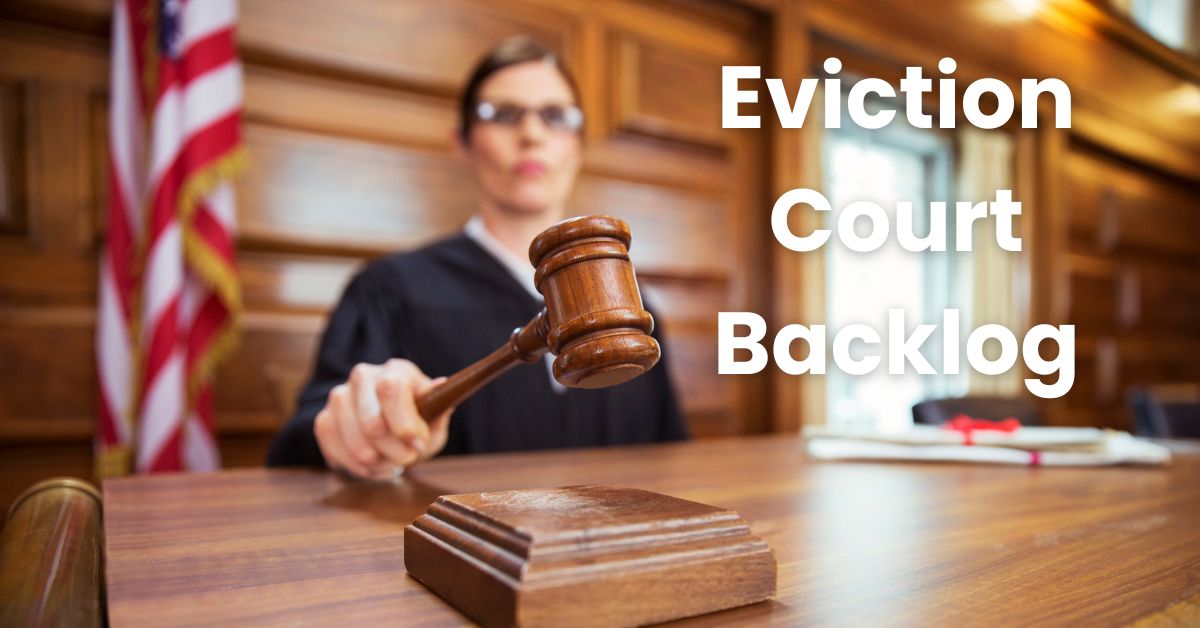The eviction court backlog crisis has become a pressing issue with far-reaching consequences for both landlords and renters. As a multifaceted problem, its existence is rooted in various underlying factors that demand comprehensive solutions. The profound impact of the COVID-19 pandemic, coupled with inadequate court infrastructure and legal complexities, has led to delays and inefficiencies in processing eviction cases. In this blog post, we will delve into the causes, consequences, and potential solutions to address the eviction court backlog. By embracing collaborative efforts and innovative approaches, we can work towards creating a more equitable and efficient housing system for all parties involved.
Causes of the Eviction Court Backlog

The eviction court backlog is a multifaceted issue with numerous underlying factors contributing to its existence. One of the primary drivers of this crisis is the profound impact of the COVID-19 pandemic, which has left a lasting imprint on the rental landscape. The economic fallout and widespread job losses triggered financial distress for countless tenants, rendering them unable to fulfill their rental obligations promptly. Moreover, eviction moratoriums and emergency protective measures, while arguably justified in safeguarding vulnerable renters during the pandemic's peak, inadvertently resulted in a mounting backlog of cases awaiting resolution when these restrictions were lifted.
However, the challenges do not end there. Strained by the unprecedented influx of cases, court systems nationwide have grappled with inefficiencies and inadequate funding. This predicament has led to prolonged delays and a snowballing caseload, further exacerbating the backlog. Compounding the issue are legal intricacies, bureaucratic hurdles, and antiquated processes, all of which contribute to the sluggish pace of case adjudication.
In light of these intricate causes, it becomes evident that a comprehensive and collaborative approach is necessary to untangle the eviction court backlog crisis and pave the way for a more equitable housing system. Addressing the root causes head-on and implementing innovative solutions can help alleviate the burden on both renters and landlords, fostering stability and fairness for all parties involved.
To tackle the backlog effectively, investing in court infrastructure, technology, and personnel is paramount. By improving the efficiency of case processing, courts can handle the increasing workload more effectively. Additionally, implementing alternative dispute resolution mechanisms, such as mediation, can expedite resolution and reduce the strain on the courts.
Furthermore, supporting tenants at risk of eviction and providing government financial assistance can help prevent evictions in the first place. By addressing the financial hardships faced by renters, we can mitigate the root causes of the backlog and promote housing stability. Of course, this only works if the system is set up and administered properly, and that simply wasn’t the case in many states and counties during Covid.
Consequences of the Eviction Court Backlog
.jpg)
The eviction court backlog has far-reaching consequences, impacting the lives of both tenants and landlords in significant ways. For renters, the uncertainty caused by pending eviction cases takes a toll on their mental and emotional well-being, leaving them stressed and anxious. The prolonged court proceedings also result in extended periods of housing instability, trapping them in a perpetual state of uncertainty and hindering their ability to find stable housing alternatives or plan for their future.
Conversely, landlords face substantial financial strain due to accumulating rent arrears and the inability to regain possession of their properties promptly. This situation is particularly challenging for individual landlords who heavily rely on regular rental income to maintain and improve their properties. The strain on their finances may lead to deferred maintenance, potentially affecting the overall quality of rental housing and, consequently, the well-being of their tenants.
As we address the eviction court backlog crisis, it becomes crucial to recognize the profound and varied impact it has on individuals and communities. The burden placed on both renters and landlords necessitates the implementation of collaborative solutions and proactive measures. By investing in court resources, streamlining eviction procedures, and providing financial assistance to at-risk tenants, we can alleviate the hardships faced by those affected and work towards a more equitable and sustainable housing system.
Furthermore, promoting mediation and alternative dispute resolution can expedite case resolution, alleviating the strain on the courts and providing a fairer and more efficient process for all parties involved.
In conclusion, tackling the consequences of the eviction court backlog requires a multifaceted and compassionate approach. Through collaborative efforts and a commitment to housing stability, we can create a more balanced housing landscape, offering relief to renters and landlords and fostering healthier and more resilient communities.
Eviction Court Backlog: Impact on Landlords

While the eviction court backlog undoubtedly affects vulnerable populations, including low-income families and minority communities, it is essential to recognize its significant impact on landlords as well. Landlords, particularly those with limited financial resources, face considerable challenges and uncertainties due to delays in evicting non-paying tenants.
One of the primary concerns for landlords is the disruption of cash flow caused by tenants who fail to pay rent. With eviction cases languishing in the backlog, landlords may find themselves struggling to cover mortgage payments, property taxes, and maintenance expenses. The prolonged absence of rental income can quickly lead to financial strain, making it difficult for landlords to meet their financial obligations.
Moreover, the inability to promptly remove non-paying tenants from a property hampers landlords' ability to re-rent the unit to tenants who can meet their rental obligations. This further exacerbates the financial burden, as vacancies mean a complete loss of rental income for extended periods. As the backlog persists, property owners may find themselves grappling with increased vacancies and diminished rental revenues, making it challenging to maintain and invest in their properties.
The frustration faced by landlords is compounded by the feeling of powerlessness in the face of an inefficient legal system. Limited resources and time constraints prevent many landlords from pursuing legal action or navigating complex legal processes, leaving them at a disadvantage when seeking resolution for tenant-related issues.
As a result of the eviction court backlog, some landlords may be forced to consider selling their properties or even abandoning the rental business altogether. This can have adverse effects on the availability of rental housing, particularly in areas with already limited affordable housing options, thus affecting both tenants and communities at large.
In conclusion, the eviction court backlog has a profound impact on landlords, especially those with limited financial means (which is the vast majority of landlords). The disruption of cash flow hindering property maintenance and investment, and the overall feeling of powerlessness in resolving tenant issues are significant challenges they face. Addressing the backlog and implementing efficient measures to handle eviction cases can help alleviate the burden on landlords and promote a more balanced and fair housing landscape for all parties involved.
Challenges Faced by the Judicial System

The eviction court backlog has emerged as a formidable challenge for the judicial system, posing numerous obstacles to its efficient functioning. The overwhelming volume of cases has placed a significant strain on courts, hindering their ability to prioritize and process cases promptly. As a result, delays and extended wait times have become all too common for tenants, landlords, and the legal entities involved.
Judges and court staff find themselves grappling with the mounting caseload, often with limited resources and time. The sheer volume of eviction cases to be heard and adjudicated creates an untenable burden, leading to fatigue and potential delays in delivering justice. Despite their dedication and commitment to ensuring a fair legal process, the backlog leaves these key stakeholders struggling to cope with the demands of the situation.
The consequences of the eviction court backlog extend beyond just inconvenience. The judicial system's overall effectiveness is compromised as the backlog disrupts the timely resolution of disputes. Delays in processing cases not only perpetuate housing instability for renters but also pose financial and emotional challenges for landlords seeking rightful remedies.
Furthermore, the backlog erodes public trust in the legal process. When individuals and businesses experience delayed justice, their confidence in the court system wanes, leading to skepticism about its ability to address their grievances adequately. A loss of trust in the judicial system can have lasting impacts on societal cohesion and the rule of law.
To overcome these challenges, the judicial system must adopt innovative approaches to case management. Investment in court infrastructure, technology, and additional personnel can help alleviate the burden on judges and court staff, enabling smoother and more efficient processing of eviction cases. Exploring alternative dispute resolution methods, such as mediation, may also help in reaching timely resolutions and reducing the strain on the courts.
Eviction Court Backlog: Potential Solutions For Landlords
.jpg)
To tackle the pressing issue of the eviction court backlog, landlords play a crucial role in implementing effective solutions. By adopting a multifaceted approach, they can contribute to expediting case resolution and promoting a fairer housing landscape. Let's explore some key potential solutions that landlords can employ to address the eviction court backlog.
- Streamlining Communication and Documentation: One essential step for landlords is to ensure clear and timely communication with tenants regarding rent payments and potential issues. By setting up streamlined communication channels, landlords can promptly address concerns and establish transparency, potentially preventing disputes that could lead to eviction cases. Maintaining thorough and organized documentation related to rental agreements, payment receipts, and communication with tenants is equally crucial. Having a comprehensive record can expedite case processing and provide evidence if legal action becomes necessary.
- Offering Flexible Payment Plans: During times of financial hardship, landlords can help prevent eviction situations by offering flexible payment plans to tenants facing temporary financial difficulties. Collaboratively creating manageable payment arrangements can maintain tenancy and prevent cases from entering the court system. However, these agreements must be put into writing and signed by both parties to make them enforceable later and to preserve your legal rights.
- Cash for Keys: Landlords may want to consider the option of offering non-paying tenants a small amount of money to vacate the property voluntarily rather than waiting for the eviction process. This is commonly called “cash for keys.” If you decide to go this route, ensure that you have a competent property manager or landlord/tenant attorney to draw up the paperwork so that it is enforceable and ensure that all bases are covered.
- Seeking Government Assistance and Rental Programs: Engaging with government assistance programs and rental subsidy initiatives can benefit both landlords and tenants. By participating in these programs, landlords can receive financial support for unpaid rent, reducing the likelihood of eviction and easing the burden on the court system.
- Advocating for Fair and Efficient Legal Processes: Landlords can join forces with housing advocates and industry organizations to advocate for fair and efficient legal processes. By actively supporting reforms that improve the court system's efficiency and accessibility to legal representation for tenants, landlords contribute to a more equitable and balanced approach to eviction cases.
As landlords implement these potential solutions, they play an integral role in addressing the eviction court backlog crisis. Emphasizing open communication, exploring alternative dispute resolution, and collaborating with tenants and relevant stakeholders can lead to a more streamlined and equitable resolution of housing disputes. By working together, landlords can be part of the solution to alleviate the eviction court backlog and foster a more stable and harmonious rental environment for all parties involved.
Collaborative Efforts to Resolve the Crisis
Resolving the eviction court backlog crisis requires collaboration between stakeholders, including government agencies, housing advocates, legal organizations, and community groups. By working together, these entities can identify innovative solutions, share resources, and advocate for policy changes to address the root causes and consequences of the backlog.
Through proactive measures and a commitment to ensuring housing stability for all, we can collectively work towards alleviating the burden of eviction court backlogs and creating a fair and just housing system for everyone.

The eviction court backlog crisis demands urgent attention and collaborative efforts from all stakeholders, including landlords. As we have explored the causes, consequences, and potential solutions, it is evident that landlords have a significant role to play in navigating this complex issue. By implementing proactive measures and innovative approaches, landlords can alleviate the burden on both themselves and their tenants.
At Revolution Rental Management, we understand the challenges landlords face amidst the eviction court backlog crisis. As a committed partner in resolving this pressing issue, we offer our specialized eviction protection services to support landlords in maintaining stable rental operations. Our team is well-equipped to guide streamlining communication, exploring mediation, offering flexible payment plans, and seeking government assistance programs.
Let us join forces to advocate for fair and efficient legal processes, contributing to a more balanced and equitable approach to eviction cases. Together, we can be part of the solution and foster a more stable and harmonious rental environment for all parties involved. Contact us today to learn more about how Revolution Rental Management can assist you in navigating the eviction court backlog and ensuring a more secure future for your rental properties and tenants.


